Last February, Paradox Interactive released their latest DLC for the WW2 real time strategy (RTS) game Hearts of Iron IV. Called La Résistance, it is the fifth large DLC since the release of HoI IV in 2016. As a big RTS and HoI IV fan, I had to play and review this game.
Before I start however, I will first give a short introduction into the world of HoI for those who are unknown with the game. In HoI IV, the player gains control over a nation in troubling times. Running from 1933 onwards, you can lead your country through peace, war, economic crises and so on. Being a RTS, the game time runs on while you play, in contrast to turn based strategy games such as Civilzation VI. This means that the player must react to situations immediately. The game focuses on the period before and during the Second World War. You can play any country you like, from the UK to Italy, from Mexico to Japan. You are in control. This means that you must build factories and infrastructure, build up and train your armies and airforce, research better weapons and technologies. Through national focuses which can be found in the Focus Tree, you can better your economy, gain advantages on the battlefield, make political advancements or gain war goals on your enemies. These are projects your entire nation works on, and cost you political power. But in the end, the focuses are the projects which can change your nation. For example: the Anschluss is a National Focus for Nazi-Germany. Without completing the focus, Nazi-Germany cannot annex Austria.
HoI IV is known for its focus on warfare and nation states, but also for the many alternate histories it provides through its Focus Trees. A communist Portugal (see image)? A democratic Germany? It is all possible. You can follow the course of history, but can also stray from that path and make your own history. This has drawn a dedicated fan base to the game, who all have their own wishes and ideas about the game and do not shy away from asking for more content. Releasing DLC with new mechanics and Focus Trees is something which Paradox has done for some time now, and the new DLC is no different.
La Resistance adds not only extended focus trees for France, Spain and Portugal, it adds quite a lot of new mechanics and changes to the game: espionage and code breaking, collaboration governments, reworked resistance and recon units; you could say that I was excited for all the new stuff the DLC was going to add! Finally, we would have a more in depth Spanish Civil War, and some new ways to play France. However, Paradox did miss the mark with some parts of this DLC. So, is it worth splashing the cash or should you resist the temptation to get this DLC? To answer this question, I played around 30 hours of the game, especially focusing on the newly added focus trees of France, Spain and Portugal, and tried some of the new espionage mechanics.
French Pretenders
Strong points:
- interesting new alternate histories to play
- the creation of a new European super power
Weak points:
- short focus tree
- unbalanced
- no real playability after focus completion
Verdict: not worth it.
The new French focus tree adds some new focuses for Free France and the Vichy Regime (which were already in the game before the DLC), but also adds a new tree where the conservative faction can restore the old monarchy. As in the base game, the focus tree let’s the player decide the outcome of the 1936 elections. The new DLC also adds another (very interesting) branch: the monarchist route.
For those who are not really up to speed on the French monarchy and its potential place in WW2 , let’s go back in time a bit. The French monarchy persisted from the establishment of the Frankish Kingdom in the early middle ages, up until the fall of the Second French Empire under Napoleon III in 1870, with some notable intervals such as the French Revolution. However, even after the fall of the French Empire, pretenders to the throne still hung around (like they always do), but they were however barred from setting foot on French soil due to the Law of Exile. In the game, the player can repeal said law and choose a monarchist ruler from three different houses: the House of Bourbon, the House of Orléans and the House of Napoleon. All houses have provided kings or emperors in the history of France.
Each house has a different branch of the focus tree, with its own focuses, its own advantages and its own disadvantages. Depending on which house you choose, you can unite the French and Spanish crown , restore the French Empire, or make France a constitutional monarchy. This might seem all nice and fancy, it can be quite overpowered. For example: the Bourbon branch lets the player annex the entirety of Spain if the monarchists have won the Spanish Civil War (more below). This makes you the ruler of not one, but two nations in Europe. You might think that is amazing, and it is, but consider that part of your country is just recovering from a gruesome civil war. No problem of course for power-hungry players, but it does have a detrimental effect on your economy. In a game about warfare and nation states, your economy is of utmost importance.
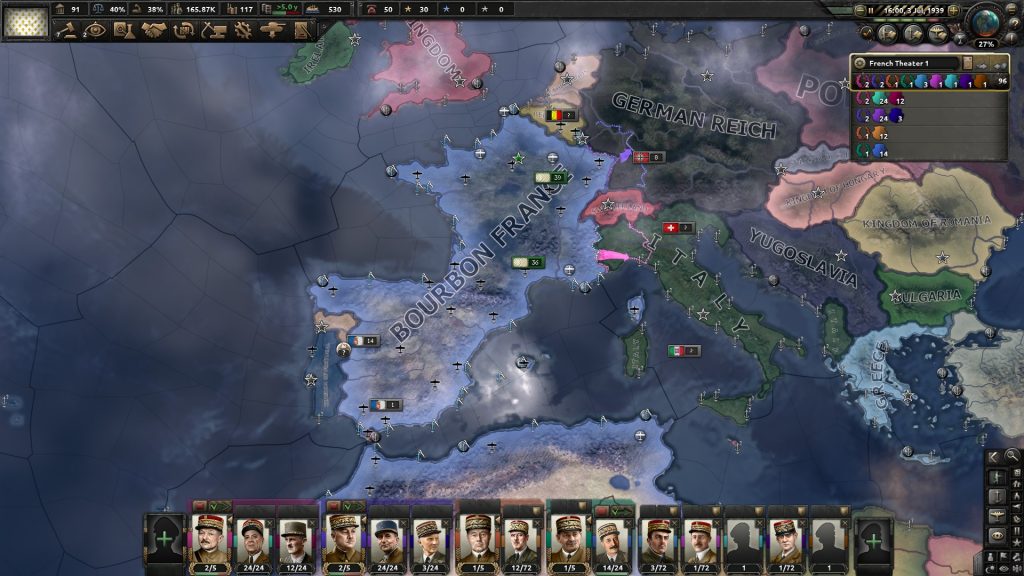
Furthermore, after unification, the Tree does not provide any more focuses. You own a large country, now what? In a game focused around warfare, the focuses that give you war goals can be very powerful. You can declare war without such a war goal, but making justifications for such wars are very expensive, time consuming and will not give you a lasting advantage. War goals are quite cheap, as they come with a focus and often only cost 70 days to achieve. Having no other focuses available after unification makes the game boring: it is the base game, but just with a different color. All in all, the French rework is a bit underwhelming.
Spanish Troubles
Strong points
- extensive rework
- plethora of options to play
- four faction Civil War is more in depth than before
- reworked map of Iberian Region
- struggle for dominance at the eve of the Civil War adds another layer of playability
Weak points
- can be overwhelming at first
- perhaps too many options?
Verdict: totally worth it!
The Spanish rework has done better. The Focus Tree has had some reworks on both the Republican, as well as on the Nationalist side. Spain’s lacklustre focus tree had been a thorn in the side for many players , who ended up reverting to mods to have a different Spanish Civil War experience. The Spanish tree now has two separate trees, with each branching off into three routes. In the nationalist tree, the players get to choose to play as fascist, Francoist (with Franco not being a die-hard fascist) or Carlist. The Republican tree has a similar build up, but players get to choose from four different branches: Republican, Stalinist, Communist or Anarchist.
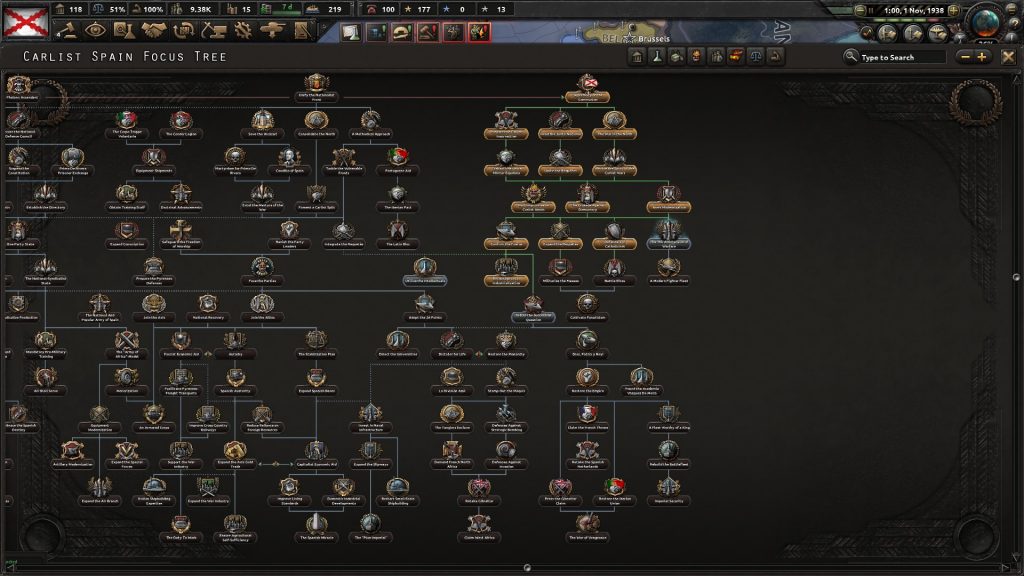
There is a plethora of choice for the players: historical playthrough of the Civil War, or a complete alternate history, which even goes against the core mechanics of HoI IV. Paradox themselves recognized that the Anarchist branch does not really fit their game as it goes against the idea of nation states. As said in their own dev diaries: ‘As Anarchist society is inherently incompatible with the way Nation-States are represented in HoI4, we’ve had to get creative with their representation.’ Paradox have opted for an approach with massive (de)buffs for the anarchist society that works quite well. Unfortunately every other country hates you, as you are anarchist. They will attack you, and the only way to stop this is to conquer everyone.
Just like the French Focus Tree, Spain also has the option for a Bourbon restoration. In contrast to its northern counterpart however, the Spanish Tree does provide more focuses after a Bourbon restoration. There is more playability after winning the Civil War, which most of the times happens around 1939. But Paradox has not only reworked the Focus Trees, they have also updated the map of Iberia. Seven new provinces have been added, and players must influence these provinces to stand by their sides in the Civil War. With the addition of this mechanic and the extra focuses, the Spanish Civil War is no longer a two way fight between the Nationalists and Republicans, but a four way fight between the Republicans, fascists, Carlists and anarchists. The Spanish rework is extensive, and is definitely worth it.
Portuguese problems
Strong points:
- more playability than before
- ability to join the Spanish Civil War makes region more interesting
Weak points:
- still a quite small and limited tree
- Portugal is limited as a country in general
Verdict: cool, but no too extensive
The Iberian Region has clearly been a major point of attention as the Portuguese focus tree has also undergone a rework. The Portuguese tree was quite boring, but the rework gives it some interesting opportunities. Just like with France and Spain, the player gets to choose either a nationalist or a communist path. You can join the Spanish Civil War through the communist branch. On the nationalist side, you can either turn fascist or monarchist. You can restore the Portuguese empire, join the Axis or help the Carlists in Spain. Remaining neutral is also an option. Of the three countries, Portugal has the smallest tree, and the least options. It is of course, also the smallest country of the three, and its (industrial) potential is therefore limited.
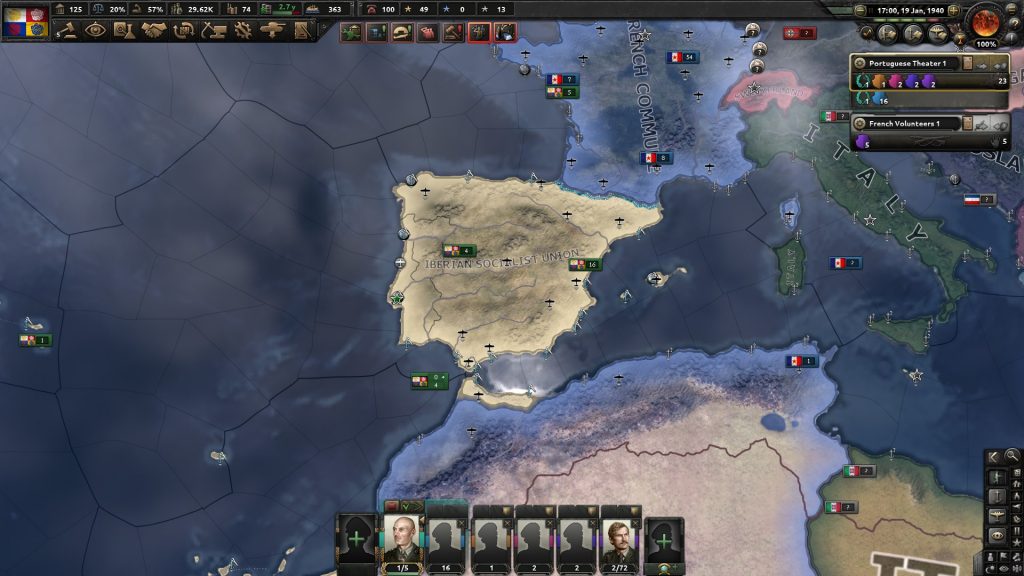
Unification is boring?
All the reworked focus trees provide much more playability and more depth to the interesting conflict in the Iberian Region. However, all the trees do contain some overpowered focuses which let the player instantly (and without much effort) annex large swaths of land. What bothers me most is that it can be done without other nations reacting to this. Wars have been fought over this in European history, so to me it seems highly unlikely that no country would react to the creation of a new European powerhouse. Even though this historical trajectory in the game veers far from what happened in actuality, Paradox could have provided other countries with some form of response to this. Most other events of this kind trigger reactions from other nations in HoI IV. For example, the annexation of Sudetenland triggers an event for France and the UK. Because there is no reaction by other powers, unification doesn’t lead to further conflict, and therefore (partly) misses the goal of the game (which is to wage war).
Paradox seems to have balanced this out with the absence of more war goals for most branches: you cannot declare some easy wars through your Focus Tree, you need to work for it. This seems to be the balancing factor for these focuses: the ones without massive annexation do gain war goals. I understand this balancing, but it can be frustrating when you have just given your utmost to restore the Bourbon kingdom, and are unable to do anything with it. Especially the French Tree suffers from this, and it is therefore my least favorite. But, La Résistance not only reworked some Focus Trees, it also added espionage to the game.
Espionage
Strong points:
- an important part of WW2 finally represented in HoI IV
- an exciting new mechanic
- not too complicated
Weak points:
- investment is high
- difficult for smaller countries
Verdict: finally we can crack some codes!
Spies, intelligence and code breaking were important during WW2. To me, code breaking and intelligence are two of the most interesting aspects of WW2. Code breaking has played an important role in some decisive battles of the war. The cracking of the Imperial Japanese Navy code made it possible for US intelligence to predict the location for the next attack (Midway), and react accordingly. In Europe, the Allies were able to crack the Nazi code transmitted through the Enigma machine. Under the lead of Alan Turing at Bletchley Park, they were able to crack the codes time and time again. At the end of the war, German secured messages could be cracked within two days. Especially during the Battle of the Atlantic, Allied code breaking was successful at determining position and strength of Nazi U-Boat wolfpacks.
Intelligence and code breaking were almost absent from HoI IV. There were some research elements dedicated to intelligence, but there was no concrete mechanic in the game. The research level decided if you gained an intelligence superiority over your enemies. This changes in La Résistance. In order to gain intelligence on your enemies, it is now required to set up an Intelligence Agency. Further upgrades let you extend the use of your agency (including a cryptology branch). With the intelligence agency, you are able to recruit operatives (spies). These spies can be used for many operations, some more related to war, some more to international politics. Where in the old version of HoI IV you could influence the politics of other countries through the diplomacy ledger, you now need to base an operative in the country, and assign the operative to spread ideology.
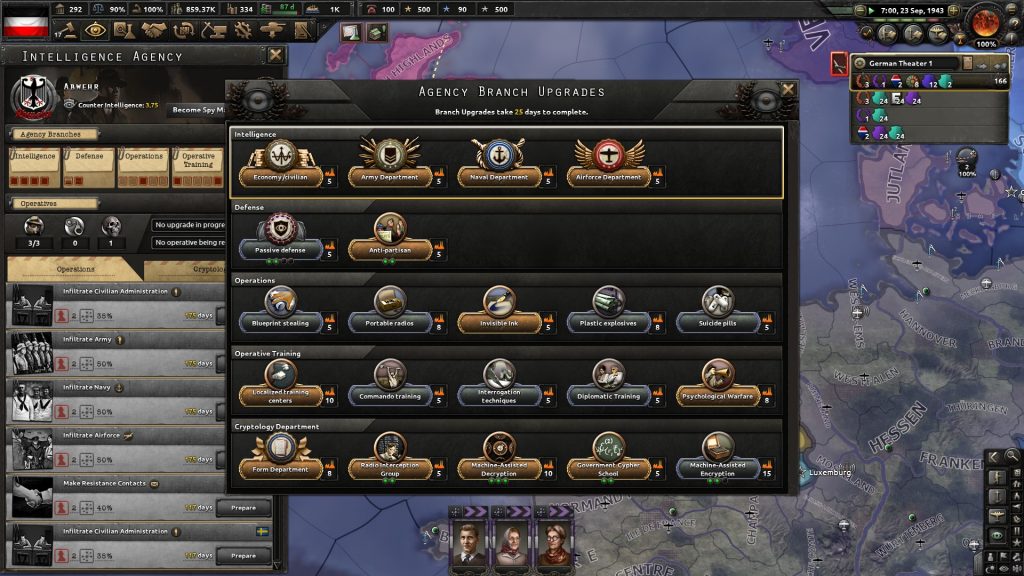
The more agency branches you have, the more operatives you can recruit. The operatives can build an extensive intel network, giving you many passive bonuses to warfare. The larger the network, the more information you gain on your opponents. This not only comes down to army strength, but also placement of civilian and military factories, army, navy and air force composition and researched doctrines. Knowing the exact strengths and weaknesses of your enemies is a huge advantage.
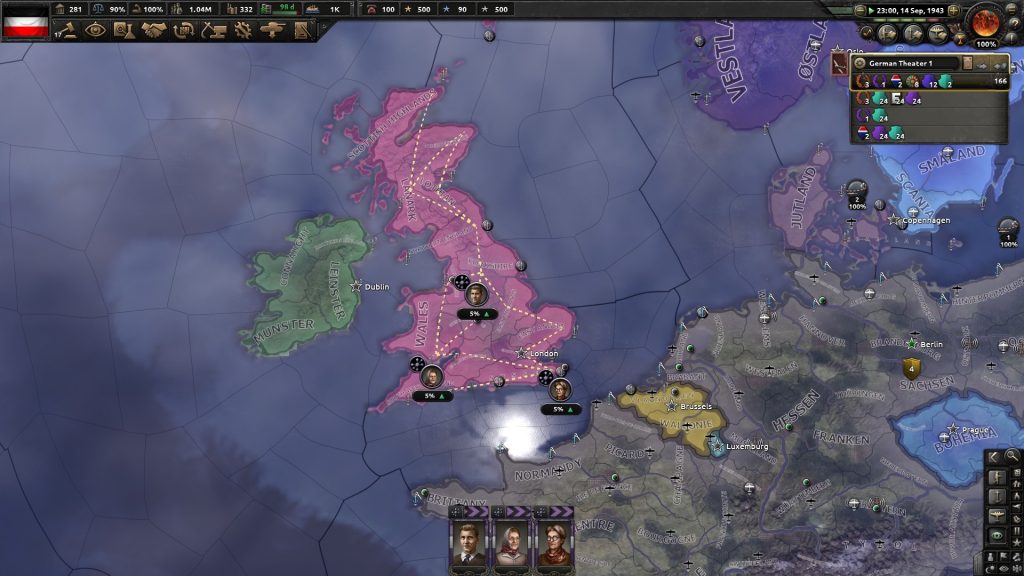
You can gain more intelligence by assigning your operatives to operations. You can infiltrate the army, prepare resistance groups or sabotage productions. There are also some historical accurate operations, such as the operation to destroy the heavy water production in Nazi occupied Norway (Operation Gunnerside). Even though the results of most operations are limited, they can halt your enemies production, or lighten resistance to occupation after the war. It is therefore worth investing in intelligence.
Cryptology now plays an important role in HoI IV. You can invest heavily in cryptology, and decipher the enemies code. This takes a while (depending on the intelligence level of the enemy), but gives massive bonuses to warfare. A passive bonus is always in play, but you can gain an even bigger bonus by activating the cipher. The enemy then knows you have cracked their code, but you gain some huge buffs. This is especially useful when invading countries or when you start a new offensive. And remember, the enemy is cracking your codes as well!
You need to use intelligence and code breaking when you want to conquer large pieces of land. However, for smaller countries (such as Portugal) it can be a huge investment. Sometimes, you do not have the required amount of factories to create an agency. You need to build more, hampering your progress. It is manageable, but it does take a while. This is, for me, the biggest downside of the new mechanic.
Conclusion
In conclusion, the new DLC provides us with elements and focuses which were longed for by the player base. The reworked focus trees of France, Spain and Portugal provide another way to approach the troubling times leading up to the war. There are many options to take. Especially the rework of the Spanish tree provides some exciting ways to win the Spanish Civil War, which can become a six way fight (like HoI IV isn’t complicated enough already). The rework of the Civil War provides a more in depth experience to the conflict, and for the good.
The French rework however is subpar. It does not offer a different experience, in contrast to the Spanish tree. Especially the absence of playability for some branches bothers me. After the Bourbon Restoration, which can happen before 1939, the tree is completed. That makes the French tree not worth it for me. However, the Spanish and Portuguese trees do offer more playability, which is pretty cool.
I love the introduction of intelligence into the game. It adds another dimension, and another depth to the game. Furthermore, intelligence played an important role in the war, and it seems to be logical for it to be included in the game. It can give you huge bonuses when fighting wars, and lets you plan ahead for further conquest. It is still quite a large investment, making it only really viable for larger countries. However, I hope Paradox will develop this mechanic even more, extending the possibilities of your operatives and balancing the mechanics of code breaking. For example, I think it would be cool to have new operations to disable enemy generals and marshalls. This would add another layer of intelligence (and counterintelligence). Expanding code breaking and intelligence would make it an even more important part of the game.
For those who already own HoI IV and are wondering if they should buy the DLC: yes, but only if you want a new mechanic in the game and an extended Spanish Civil War. For those who do not own HoI IV and are wondering if they should buy the base game, and the DLC: also yes, but keep in mind there are also other DLC out there! The Spanish Civil War (and the Spanish tree in general) is great, but you must consider the price you pay for this (€19,99 is quite a bit of money for a DLC). If you do not want to invest, perhaps try some mods before you buy it, or wait until it is cheaper (or on sale). By that time, Paradox have also most likely rebalanced some of the trees and hopefully given them more relevance in the later game (they have already announced some beta patches with some considerable rebalancing going on!)
But, if you have never played any Hearts of Iron games, or HoI IV before, this might be the time to start! These games are great if you have time on your hands, as they have a steep learning curve but are a lot of fun to play. Putting up a firm resistance against dark foes you can outstrategize is something we can all do with right now!
